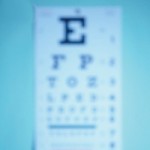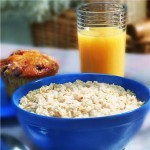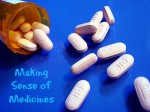Vitamin D: Best For People Who Don’t Have Diabetes?
Vitamin D may be best for people who don’t have diabetes
 A study by the VU University Medical Center in Amsterdam found that vitamin D had no effect on the insulin function of people with diabetes. Over 100 people (all living in the Netherlands as immigrants) were tested for 16 weeks. For those who already had diabetes, no difference was found between taking a vitamin D pill or a placebo. However, those who did not already have diabetes had better insulin function when enough of the vitamin was taken. This could mean that vitamin D, which we get from sunlight, egg yolks, milk, oily fish and supplements, can help prevent diabetes. However, since this test used only a small number of people, more research is needed to know for sure.
A study by the VU University Medical Center in Amsterdam found that vitamin D had no effect on the insulin function of people with diabetes. Over 100 people (all living in the Netherlands as immigrants) were tested for 16 weeks. For those who already had diabetes, no difference was found between taking a vitamin D pill or a placebo. However, those who did not already have diabetes had better insulin function when enough of the vitamin was taken. This could mean that vitamin D, which we get from sunlight, egg yolks, milk, oily fish and supplements, can help prevent diabetes. However, since this test used only a small number of people, more research is needed to know for sure.
Sugary drinks put boys at higher risk of Metabolic Syndrome
 Researchers in Taiwan carried out tests on young boys and girls to find out what effect sugary drinks, like soda, had on their health. Over 2,700 boys and girls between the ages of 12 and 16 were tested for a condition called Metabolic Syndrome, which involves obesity, high blood pressure and high blood glucose levels, among other problems. It was found that boys, in particular, were more at risk of developing this condition when they had 2 or more sugary drinks every day. Girls were at a much lower risk, and those who drank less than 2 cans each day were even safer.
Researchers in Taiwan carried out tests on young boys and girls to find out what effect sugary drinks, like soda, had on their health. Over 2,700 boys and girls between the ages of 12 and 16 were tested for a condition called Metabolic Syndrome, which involves obesity, high blood pressure and high blood glucose levels, among other problems. It was found that boys, in particular, were more at risk of developing this condition when they had 2 or more sugary drinks every day. Girls were at a much lower risk, and those who drank less than 2 cans each day were even safer.
Parents who sleep well might have healthier children
 Past studies have shown that consistent, good quality sleep can stop young children from becoming overweight or obese later in life. Researchers from the University of Illinois wanted to know if parents’ sleeping habits could have anything to do with how much–and how well–their children slept. So, they tested over 300 preschool children as part of a study to find out how their parents’ sleep affected them. It was found that parents who got plenty of sleep each day (7 hours or more) often had children who did the same. The study also showed that these children were much less likely to become obese, and those who did not get enough sleep had a higher risk.
Past studies have shown that consistent, good quality sleep can stop young children from becoming overweight or obese later in life. Researchers from the University of Illinois wanted to know if parents’ sleeping habits could have anything to do with how much–and how well–their children slept. So, they tested over 300 preschool children as part of a study to find out how their parents’ sleep affected them. It was found that parents who got plenty of sleep each day (7 hours or more) often had children who did the same. The study also showed that these children were much less likely to become obese, and those who did not get enough sleep had a higher risk.
Watercress considered best in new “powerhouse food” list
 William Paterson University in New Jersey has created a list of 41 “powerhouse foods” to help consumers choose the best produce for their health. The fruit and vegetables are ranked from most to least nutritious. Each food is tested and ranked based on how much fiber, protein, vitamins, and minerals it contains. At the top of the list are leafy greens such as Chinese cabbage and spinach. And, surprisingly, the number one most nutritious powerhouse food is watercress. This vegetable, found in streams and lakes, is full of fiber, antioxidants, and has more of vitamins A, C, and K than milk! It is sold in most grocery stores and has a mild, peppery flavor that is great in salads and sandwiches.
William Paterson University in New Jersey has created a list of 41 “powerhouse foods” to help consumers choose the best produce for their health. The fruit and vegetables are ranked from most to least nutritious. Each food is tested and ranked based on how much fiber, protein, vitamins, and minerals it contains. At the top of the list are leafy greens such as Chinese cabbage and spinach. And, surprisingly, the number one most nutritious powerhouse food is watercress. This vegetable, found in streams and lakes, is full of fiber, antioxidants, and has more of vitamins A, C, and K than milk! It is sold in most grocery stores and has a mild, peppery flavor that is great in salads and sandwiches.
Full-fat yogurt might help prevent obesity
 Researchers at the University of Nevarra in Spain carried out a 6-year study on over 8,500 people to find out the effects that eating yogurt might have on weight gain. The participants were split into groups based upon how much yogurt they ate each week, and whether they liked full-fat or low-fat yogurt. They found that the people who ate the most yogurt had a 12% lower chance of becoming obese, and 19% lower chance if they ate mostly full-fat varieties. However, there was no difference between people who ate low-fat yogurt and those who ate only small amounts of either kind. More research is needed to know if yogurt can help you avoid weight gain, but this study does show that full-fat dairy products can be a part of a healthy, balanced meal plan.
Researchers at the University of Nevarra in Spain carried out a 6-year study on over 8,500 people to find out the effects that eating yogurt might have on weight gain. The participants were split into groups based upon how much yogurt they ate each week, and whether they liked full-fat or low-fat yogurt. They found that the people who ate the most yogurt had a 12% lower chance of becoming obese, and 19% lower chance if they ate mostly full-fat varieties. However, there was no difference between people who ate low-fat yogurt and those who ate only small amounts of either kind. More research is needed to know if yogurt can help you avoid weight gain, but this study does show that full-fat dairy products can be a part of a healthy, balanced meal plan.
Banning sugary drinks from being bought on food stamps might improve health
 Researchers from Stanford University have claimed in a new study that not allowing sugary beverages, like soda and energy drinks, to be bought on food stamps, might help lower obesity and diabetes rates. Food stamps are a big source of income for soda companies, as another study found that more than half of all sugary drinks are bought on food stamps. The researchers think that obesity in food-stamp users could go down by about 2% over the course of 10 years if the ban goes ahead.
Researchers from Stanford University have claimed in a new study that not allowing sugary beverages, like soda and energy drinks, to be bought on food stamps, might help lower obesity and diabetes rates. Food stamps are a big source of income for soda companies, as another study found that more than half of all sugary drinks are bought on food stamps. The researchers think that obesity in food-stamp users could go down by about 2% over the course of 10 years if the ban goes ahead.
Sunscreen may not prevent skin cancer
 Recent research from the University of Manchester in England has shown that using strong sunscreen might not prevent you from getting malignant melanoma (a deadly form of skin cancer). The study involved mice exposed to UV light, designed to copy the effects of the sun. Even the strongest sunscreen only slowed down the development of melanoma; it didn’t prevent it. However, sunscreen may still be useful as long as it is used with other safety measures, like staying in the shade and not sunbathing for too long. This is most important for people with pale skin or a large number of moles.
Recent research from the University of Manchester in England has shown that using strong sunscreen might not prevent you from getting malignant melanoma (a deadly form of skin cancer). The study involved mice exposed to UV light, designed to copy the effects of the sun. Even the strongest sunscreen only slowed down the development of melanoma; it didn’t prevent it. However, sunscreen may still be useful as long as it is used with other safety measures, like staying in the shade and not sunbathing for too long. This is most important for people with pale skin or a large number of moles.
Certain blood pressure medicines might be connected to vision loss
 Some recent studies have shown that certain medicines used to lower blood pressure might be related to serious eye conditions. The University of Wisconsin School of Medicine and Public Health published a 25-year long study of almost 5,000 people between the ages of 43 and 86. Certain medicines raised their chances of developing a condition called Age-related Macular Degeneration (AMD), by 72%. AMD has been known to cause partial or complete loss of sight in older people. However, the scientists say that much more research is needed before the study results can be known for sure.
Some recent studies have shown that certain medicines used to lower blood pressure might be related to serious eye conditions. The University of Wisconsin School of Medicine and Public Health published a 25-year long study of almost 5,000 people between the ages of 43 and 86. Certain medicines raised their chances of developing a condition called Age-related Macular Degeneration (AMD), by 72%. AMD has been known to cause partial or complete loss of sight in older people. However, the scientists say that much more research is needed before the study results can be known for sure.
New study finds no difference in weight loss if you skip breakfast
 A new study of overweight and obese people has tried to measure the effect that a person’s decision to eat breakfast has on their ability to lose weight. Over 16 weeks, 300 people were split into groups based on whether they were told to eat breakfast, skip it, or to decide for themselves. It was found that deciding to skip breakfast made no noticeable difference in weight loss, though the researchers say that they did not measure other health effects. Because of this, more studies are needed to find out exactly how important breakfast is to a person’s health.
A new study of overweight and obese people has tried to measure the effect that a person’s decision to eat breakfast has on their ability to lose weight. Over 16 weeks, 300 people were split into groups based on whether they were told to eat breakfast, skip it, or to decide for themselves. It was found that deciding to skip breakfast made no noticeable difference in weight loss, though the researchers say that they did not measure other health effects. Because of this, more studies are needed to find out exactly how important breakfast is to a person’s health.
Metformin may be more effective for African Americans with diabetes
 A new study from the Henry Ford Health System in Detroit has shown that the common diabetes medicine, metformin, may be more effective for African Americans than for white Americans. In the past, research has concentrated on the effects of metformin for white Americans with diabetes, so researchers decided to see how effective it is in a different population. In a group of nearly 10,000 African Americans, metformin was more than twice as effective at keeping blood glucose levels healthy than in white Americans. Since African Americans are more likely to suffer from diabetes complications, this is great news.
A new study from the Henry Ford Health System in Detroit has shown that the common diabetes medicine, metformin, may be more effective for African Americans than for white Americans. In the past, research has concentrated on the effects of metformin for white Americans with diabetes, so researchers decided to see how effective it is in a different population. In a group of nearly 10,000 African Americans, metformin was more than twice as effective at keeping blood glucose levels healthy than in white Americans. Since African Americans are more likely to suffer from diabetes complications, this is great news.

